Monroe County council unanimously rejects North Park jail site funding after marathon meeting
At a marathon Monroe County Council meeting on Tuesday, the appropriation ordinance to pay for the purchase of the North Park property for a new jail was met with unified resistance from both the council and the public, culminating in a 0–7 vote on the item.
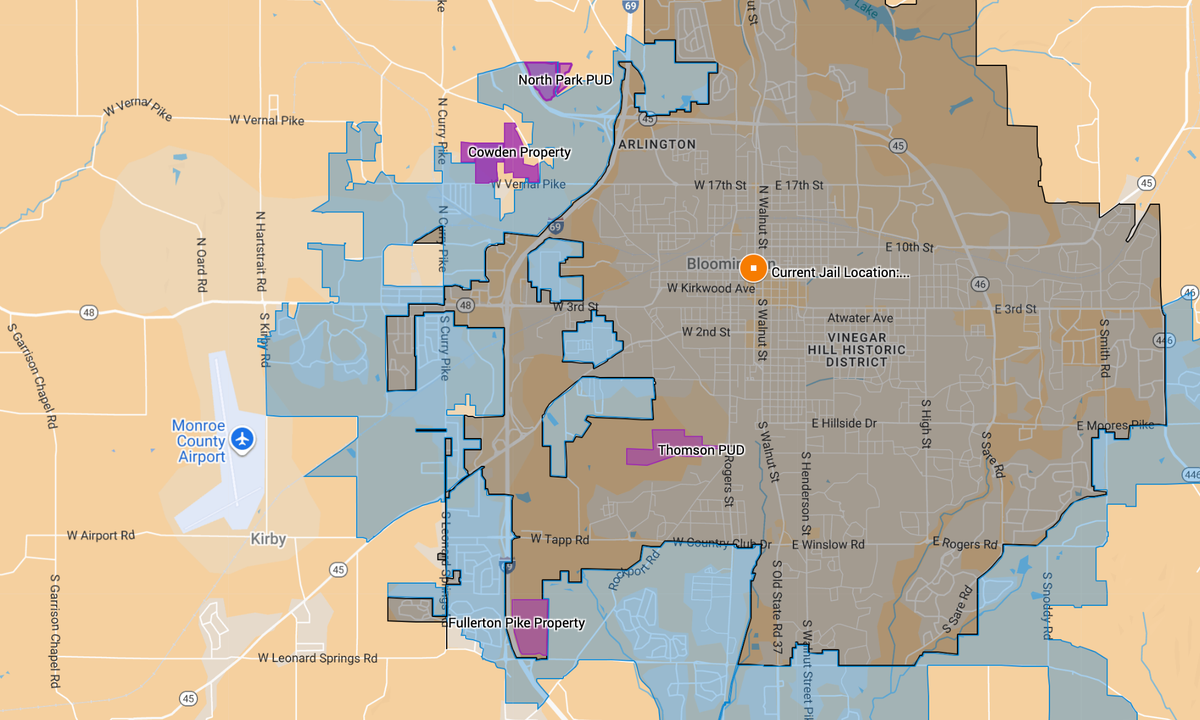
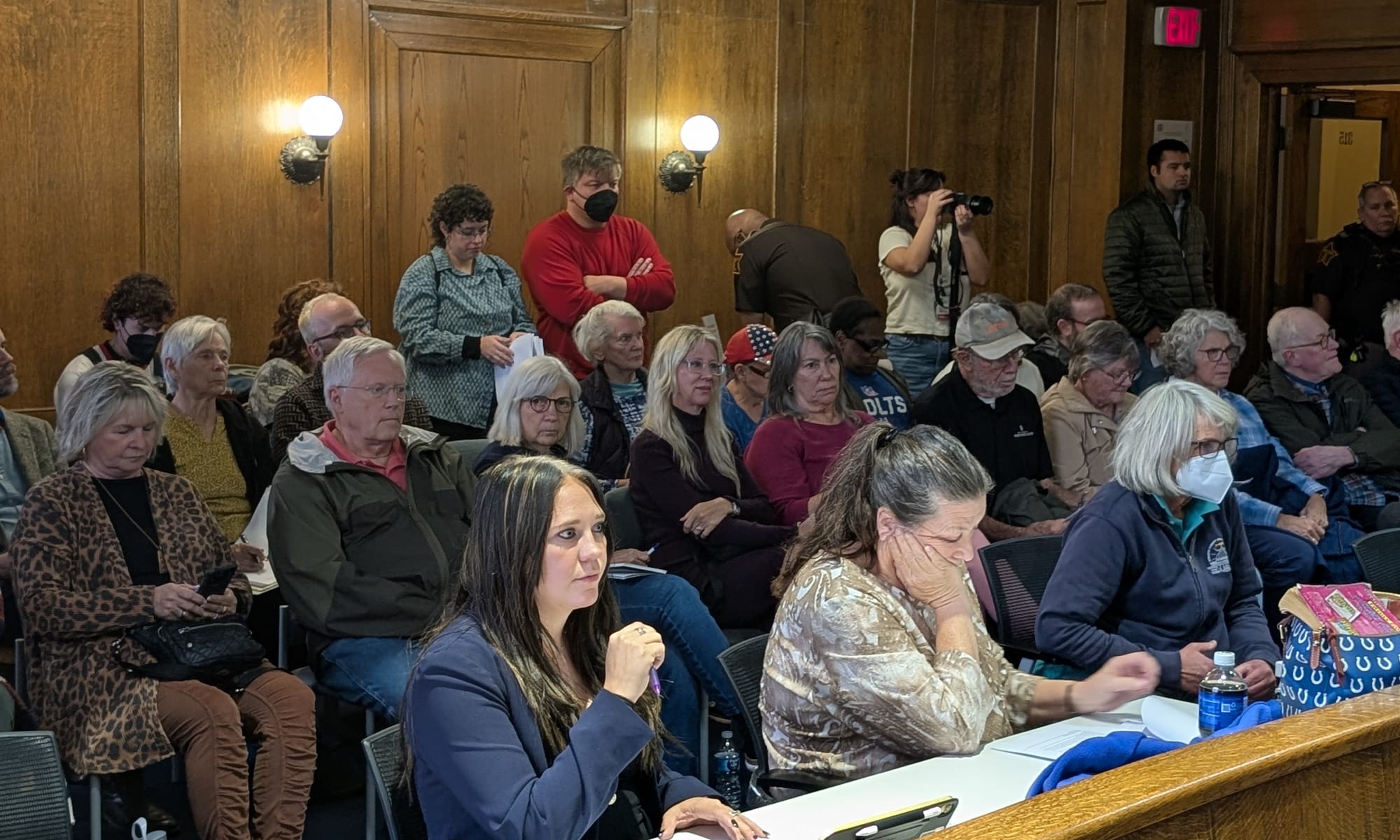
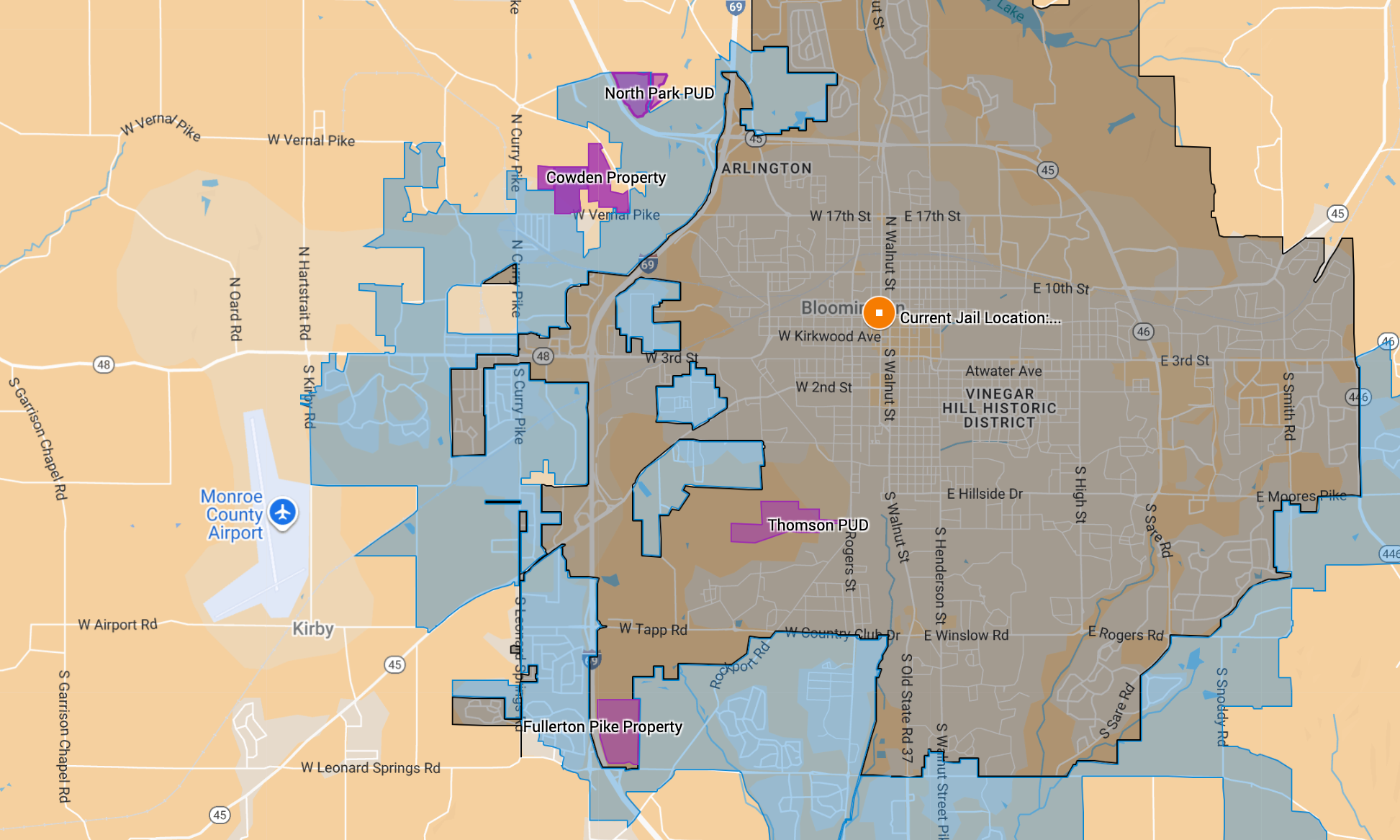
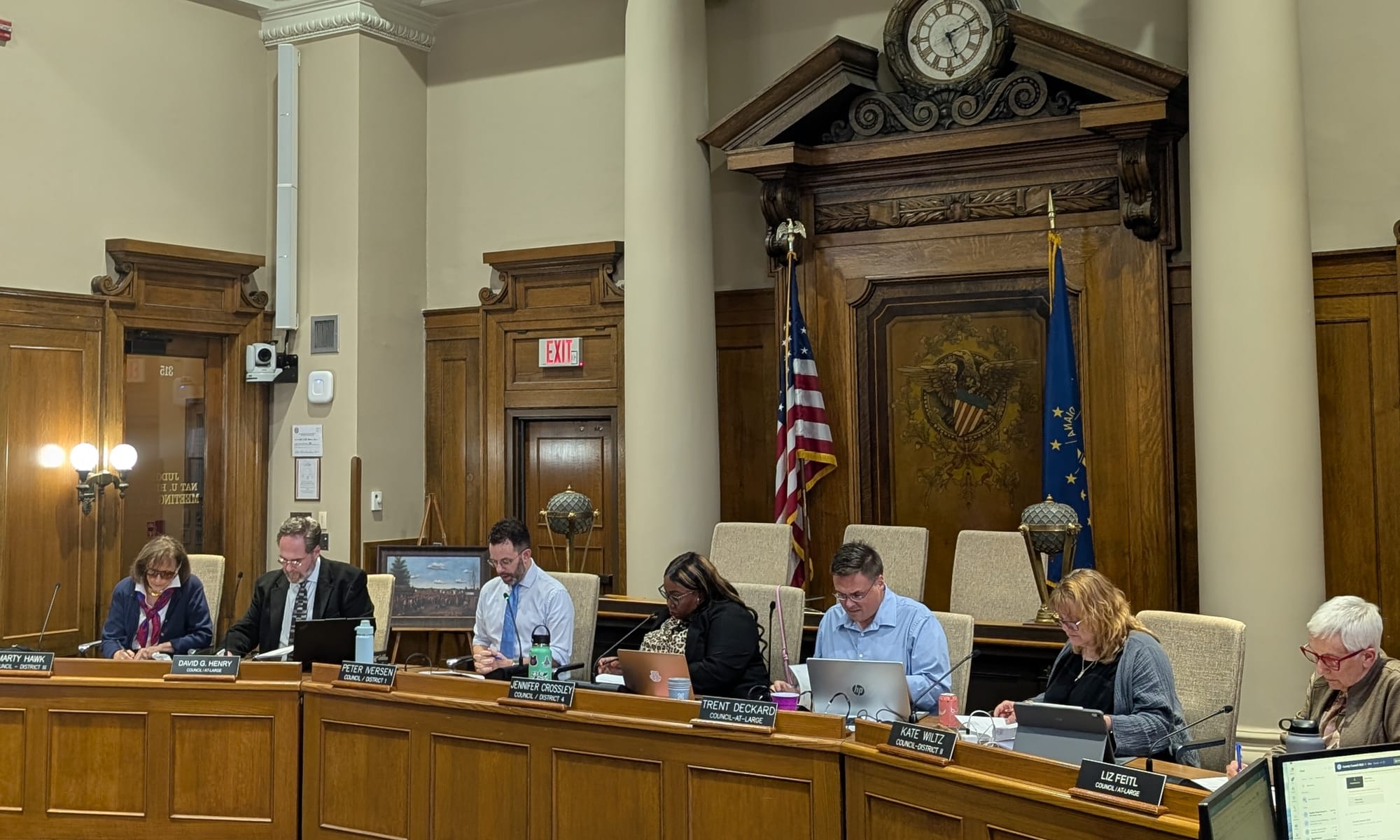
Middle: Map by The B Square. Purple properties have been given serious consideration by Monroe County official as the site of new jail. The orange dot is the location of the current jail. The blue areas are all a part of pending litigation involving their annexation into the city of Bloomington. [link to dynamic map] Left: The crowd at the county council's meeting in the Nat U. Hill room (Dave Askins, Oct. 28, 2025) Right: Monroe County council gets set to start its meeting. (Dave Askins, Oct. 28, 2025)
At a marathon Monroe County council meeting on Tuesday, the appropriation ordinance to pay for the purchase of the North Park property for a new jail was met with unified resistance from both the council and the public, culminating in a 0–7 vote on the item. North Park is located just northwest of the current city limits, off SR-46.
The meeting started at 5 p.m. and vote came around 11 p.m. Several other items appeared on the agenda, not just the land purchase. Later, after midnight, the council took another unanimous vote to explicitly deny the appropriation for the North Park site. That was on the advice of county attorney Molly Turner-King.
It was the county commissioners who made the request on Tuesday’s agenda for the appropriation, to pay for the part of the $11.375 million land purchase that was not covered by a bond anticipation note (BAN).
The basic perspective of the commissioners was that several sites had been considered, and the purchase of the North Park site had already been approved by both the commissioner and the county council a year ago. President of the board of commissioners, Julie Thomas, put it like this on Tuesday night, when she said to the council, which is the fiscal body of the county: “The question is: Are you ready to pay the bill?”
The purchase agreement called for a closing by June 1, 2025.
The plan for a new jail has a long history, and is based on overcrowded conditions at the current facility, which prompted a lawsuit by the ACLU in 2008. The jail continues to be operated under a settlement agreement with the ACLU. The basic nuts and bolts of the 40-year old building have led consultants to conclude that it is “failing.”
The basic math for funding the project, which has a working construction budget of $225 million, changed after the passage of SEA 1 by the state legislature earlier this spring. In broad strokes, the county government now cannot afford a project that includes a complete justice center—jail, sheriff's office, courtrooms, public defender, and prosecutor’s office. And it’s not even clear that just a new jail would be affordable.
When the council finally reached the item, on a long agenda, around 20 public commenters took the lectern or dialed in virtually, voicing concerns that spanned from the financial burden of a new facility—estimated at $225 to $300 million—to the disruption of downtown’s role as the legal and civic hub. Several speakers criticized the loss of accessibility, questioning the wisdom of moving justice services away from the city center, and argued that building a “mega jail” would only perpetuate cycles of incarceration.
Those who spoke on the agenda item itself added to several people who spoke during the time for public comment at the start of the meeting, which is meant for topics not on the agenda. Council president Crossley exercised her discretion to just go ahead and allow such commentary—it was a fine distinction between speaking against construction of a new jail and speaking against the land purchase for the site of a new jail.
“Justice should be accessible to everyone, not just those who can drive across town,” one community member told the council, reflecting widespread concern about transportation barriers and equity. Many urged investment in services—mental health, addiction treatment, and social programs—rather than new cells, with references to national incarceration rates and the local success in reducing jail population under existing leadership.
One of the highlights of public comment came when former mayor John Hamilton read aloud the better part of a letter he had written with former city councilmember and county commissioner Charlotte Zietlow—significant because the pair had in the past been at odds on various political issues. But they were in agreement on their view that a new jail should not be built. Zietlow is the nonagenarian namesake of Monroe County’s Charlotte T. Zietlow Justice Center, which houses the existing jail at College Avenue and 7th Street.
During deliberations, councilor David Henry pressed on the immediate and long-term tax consequences, warning that “something like one-third of every local income tax dollar after next year ... will go to the jail first”—leaving scant funding for all other county needs.
Henry said that these numbers render the project unsupportable, saying, “The math does not change, and the math does not fly.” He stressed the need to face the consequences of decades of decisions made behind closed doors, but was adamant about not inheriting the blame, having taken office just 10 months ago: “I’m not gonna own it. I’m not owning it. This started a long time ago. So here we are in the 11th hour, trying to solve a problem.”
Councilor Trent Deckard was the sole vote in favor of his own motion to postpone a decision, and talked about the complexity of the issue as a “wicked problem,” echoing public comments on the night. “Things are always changing. You do one thing, it starts another thing, and down the road you go.” Deckard admitted the pain and frustration of “can-kicking,” urging colleagues to “preserve every option you have possible.”
Deckard praised the remarks from the public mic by jail commander Kyle Gibbons, who delivered impromptu remarks towards the end of the time for comment.
Gibbons had expressed frustration at the lack of progress on the jail project, telling councilors: “I’ve got 240 inmates inside that facility right now, and I care about them every day.” He continued, “I don’t get to have theories and ideas on how to fix things, because I’m the person that has to fix it right now.”
Gibbons added, “It’s not anybody’s fault in this room.” But what is everyone’s fault, Gibbons said, is getting lost in other things and not having a “true conversation” to talk about what should happen. Gibbons takes pride in his work: “I’m the best jail commander, I think, in the state.” He had been at work for 15 hours that day and found it difficult to listen to people talk about “what is going to happen down the road.” Gibbons told councilors, “I can’t wait—and I know you guys can’t either— but I’m back here pacing like a caged lion, because it’s so upsetting.”
Deckard called on anyone with alternative sites to “say it publicly,” adding the advice of his grandmother “Don’t just be agin it.” Deckard said, “Somebody has to do something, sometime, somewhere, somehow other than just simply say it’s not possible or feasible.”
Council president Jennifer Crossley talked about the need for substantive partnership: “I urge our city council colleagues to not just talk about it, not just talking to me through a letter, but talk with us, join in this conversation.” That was an allusion to a letter, opposing the North Park purchase, which the Bloomington city council had sent to the county council. City councilmember Sydney Zulich, who had drafted the letter, read it aloud on Tuesday night from the public mic.
Crossley said, “I think that it’s easy to call out flaws, but it’s so challenging and rewarding to sit down and be down in the trenches with all of us to figure out this complex problem. Because again, it’s not just a Monroe County problem. It is a city of Bloomington problem. It’s all of our problems.”
Crossley pushed back a bit on Hamilton, after he read aloud his and Zietlow’s joint letter, recalling the occasion about five years ago when Hamilton was mayor and his administration removed a homeless encampment from Seminary Park. Then-chair of the Monroe County Democratic Party, but not yet an elected official, Crossley at the time went to the park and spoke during one of the nighttime rallies in support of the camp residents.
On Tuesday night, Crossley put it like this: “I think sometimes we have short term memory of things that have happened in our community in the past. And I wish that the former mayor had a little bit more energy when folks were being kicked out of Seminary Park.” She said that he could have used some of the funding “for those folks that are still in Seminary Park.”
County commissioner Jody Madeira also pushed back on the idea that was a big part of much of the public commentary, which is that renovation of the existing facility of the Zietlow Justice Center is possible. “We have to build a jail,” she said. Madeira acknowledged the improvements to basic sanitary conditions of the jail that new sheriff Ruben Marté had implemented. “Sheriff Marté has done amazing things, but you can only put so much lipstick on a pig, even if it’s a pig named for a beloved community leader.” She added “Why are we condemning our inmates, our guards and our staff to live and work in hell?”
Madeira pointed to the impact that state-level policies have on local conditions, which means that the size of the jail population is not always under local control: “In Indiana, the size of the incarcerated population is driven primarily by state policy, not local choice,” she said, citing how state laws control sentencing, court rules, and eligibility for diversion. She warned that, regardless of county intentions to reduce incarceration, new minimum bail proposals and state requirements may force higher jail populations.
Madeira also underscored the urgent constitutional crisis, detailing the current jail’s failings—lack of adequate medical and mental health facilities, insufficient space, and exposure to lawsuits both present and future.
The final motion to fund the North Park property purchase failed by a unanimous vote.
Another related item on the council’s Tuesday agenda, to authorize sale of the Thomson PUD, which was once seriously considered as the site of a new jail, was postponed until the next county council meeting on Nov. 10.



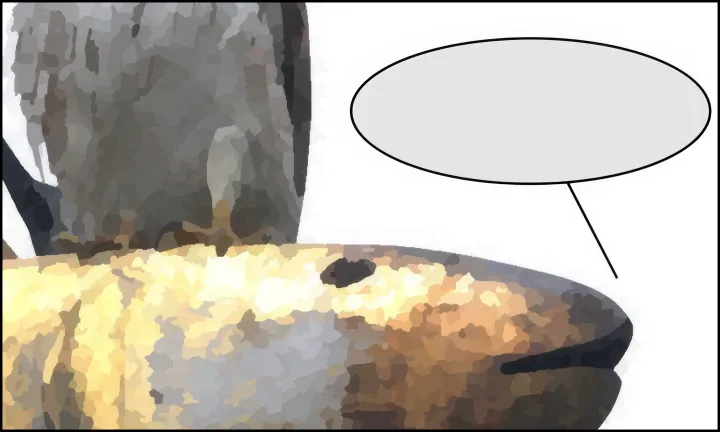
Comments ()